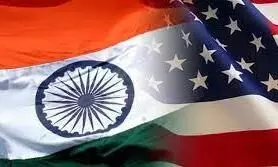
New USTR slams India's tariff hikes, equalisation levy.
text_fieldsNew Delhi : The US Trade Representative (USTR) in its latest report on Foreign Trade Barriers released on March 31 by Joe Biden Administration's newly appointed USTR, Katherine Tai has highlighted major trade barriers to American exports, FDI and e-commerce.
The report found India's trade policies discriminatory which creates both tariff and non-tariff-barriers and poses a threat to US trade and imports to India.
This comes days after the USTR proposed a retaliatory trade action — of up to 25% tariffs on basmati rice, seafood and gold — against India for imposing an equalisation levy on certain American companies.
Earlier in January 2021, USTR had found India's Equalisation Levy as discriminatory and unreasonable, creating a significant new tax burden for the US companies and/or restricting US commerce -- forcing them to undertake costly compliance measures.
Clarifications issued by the Finance Ministry on February 2021 has not improved the scenario. US companies across the board have complained that the latest interpretation means that even merchandise trade will be subject to Equalisation Levy. Further, the new interpretation is also increasing nervousness and fear of tax terrorism, due to the retrospective impact of such levy.
According to the report, the United States' trade deficit with India in 2020 was up 1.7 per cent to $23.8 billion, exports down 20.1 per cent to $27.4 billion, and India's imports down 11.3 per cent to $51.2 billion, from last year. The report highlights that the US exporters continue to encounter significant tariff and non-tariff barriers. Additionally, there exists large disparities between WTO bound rates and India's MFN applied rates -- currently the highest in the world at 17.6 per cent.
In addition, the report also highlights the unpredictability and opaqueness that plagues India's tariff regime and how it poses major challenges to the US trade to India. As per the report, the Indian Government used the last two Union Budgets to increase tariffs on approximately 70 product categories, including key US exports, without warning or public consultation.
The report also places a major focus on barriers to Digital Trade. From wide-ranging data localisation requirements across sectors and policies like the Personal Data Protection Bill, 2019, RBI localisation guidelines, yet-to-be-released e-commerce policy to the much-discussed Equalisation Levy, the USTR claims that these digital barriers will impede foreign trade and increase the risk of retaliation from other countries, putting interests of Indian companies at risk.
Commerce Minister Piyush Goyal has made every attempt to negotiate a trade deal with previous USTR since September 2019, but with no success. Fresh tariff hikes, equalisation levy and the recently notified IT Rules highlighted in the report, will further queer the pitch for a trade negotiation with the new USTR Katherine Tai, with whom Goyal has already held an introductory meeting two weeks ago.
As per the USTR, the recently notified IT Rules "incentivize overly restrictive approaches to policing non-IP user-generated content and will undermine many Internet-based platform services."
(with inputs from IANS)


















